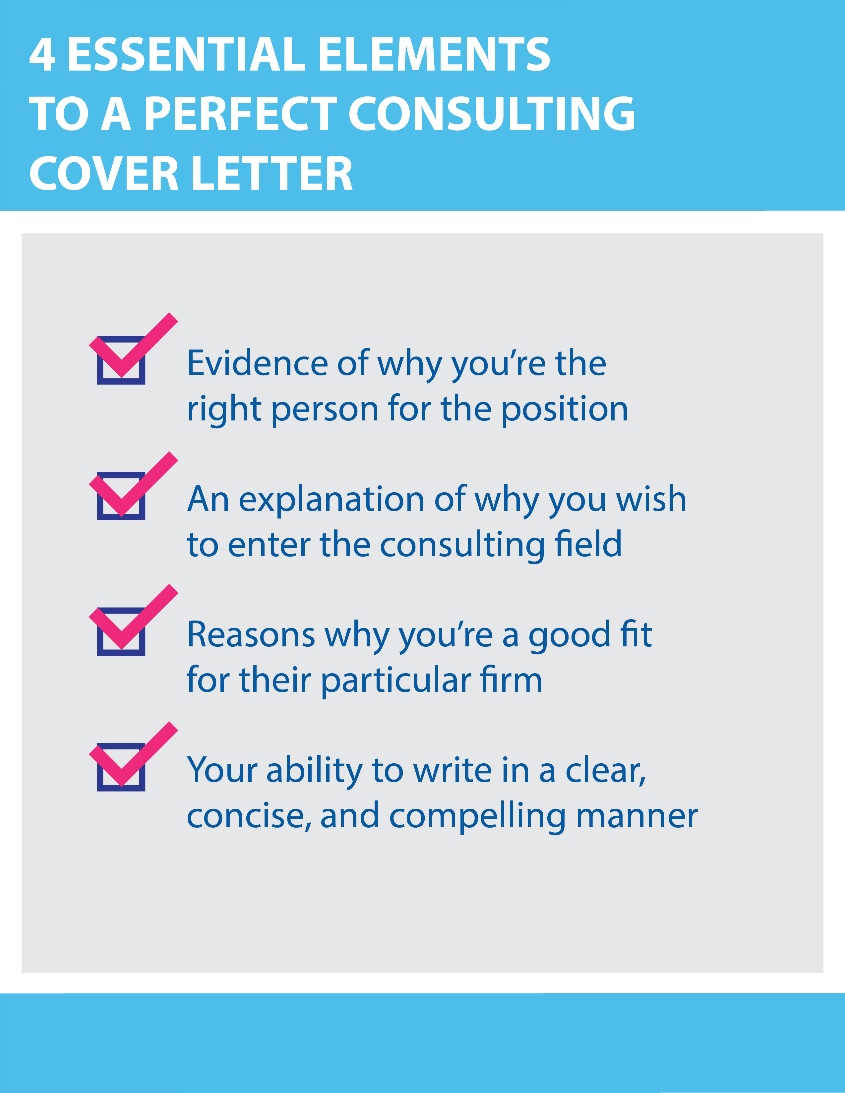FREE Resume Tips Email and Video Series
This form collects your name and email so that we can add you to our email list that delivers the free resources you are requesting. Check out our privacy policy for details on how we protect and manage your submitted data.
We’ll never spam you or share your email. Unsubscribe at any time.
Your cover letter can make a big difference when applying for a management consulting position. Because the cover letter is typically read before your resume, it plays an essential chronological role during the application process.
Consulting firms will typically read your cover letter to quickly identify what makes you different from thousands of other applicants. Therefore, writing a strong and unique cover letter can make you stand out from the competition and ensure that your achievements aren’t overlooked.
A strong cover letter presents an excellent opportunity for you to demonstrate why you’re the best candidate for the job, and to plead your case as to why the firm should hire you over other applicants.
This guide will cover 11 essential steps towards writing the perfect consulting cover letter.
Tip 1 — Know What Consulting Firms Are Looking For
The top consulting firms receive hundreds of thousands of applications each year. For example, McKinsey receives approximately 200,000 applications annually, of which only 2,000 applicants receive an offer. Consulting firms are faced with the arduous task of narrowing down the candidate pool to include only the best.
Interviewing candidates is not a cheap process. The firm wants to ensure that any candidate they interview is qualified for the position, is prepared for management consulting as a career, and is a good fit for the firm.
Therefore, top consulting firms look for four essential elements in a cover letter.
- Evidence of why you’re the right person for the position
- An explanation of why you wish to enter the consulting field
- Reasons why you’re a good fit for their particular firm
- Your ability to write in a clear, concise, and compelling manner

When reading cover letters, screeners will often ask,“Did the applicant spend enough time preparing a strong letter? Have they done their homework regarding the firm and the position in question? Do they have adequate writing skills to prepare compelling emails, reports, and presentations?“
A cover letter is a challenging document to prepare. You may feel worn out after spending hours on your resume, only to realize that you also need to spend as much time (if not more) on your cover letter.
Rather than looking at your consulting cover letter as an annoying extra step, think of it as an excellent opportunity to emphasize your skills and experiences and to set yourself apart from other applicants.
Tip 2 — Make Sure the Letter Has TheseFiveDistinct Sections
While your cover letter doesn’t need to take a formulaic approach, there are five distinct sections that should be covered. They are:
- An Introduction
The introduction should contain which position you’re applying for, your name, address, and contact information. It should also be short, sweet, and entertaining. Write it in such a way that the screener will want to keep reading into the second paragraph.
- Why You’re a Great Candidate
This is the section where you should blow your own horn. Each sentence should speak to your skills, education, and experiences — tying everything back to why you’re a great candidate. Ideally, this section should include your top three achievements to date (relevant to consulting, of course).
- Why Consulting is the Right Fit for You
Remember that the top priority of most consulting firms is to find out whether you’ll become a great consultant if hired. Even with memorable and unique qualifications, a recruiter may not be convinced that these skills will make you a good management consultant. To leave no doubt in their mind, dedicate a section towards explaining why you’re the right person for the job. You can use previous experiences (such as internships, jobs, or academic courses) to tie your career goals to the position in question.
- Why You’re Applying for the Position
The next section should cover why you chose to apply for this exact position in this firm. When laying out your case, identify unique reasons as to why you think McKinsey, Bain, BCG, Deloitte, or any other firm is your firm of choice. To make a compelling argument, identify specific people, reports, or projects that make your story believable. Don’t hesitate to mention specific employees or projects that caught your eye and sparked your interest.
- A Solid Conclusion
Finalize the letter by restating why you believe you’re a great candidate and how you can be of value to the company.
Tip 3 — LinkYour Cover Letter to Your Resume

A consulting cover letter is essentially an opportunity for you to expound on the information you wrote in your resume. What does this mean? It means that your cover letter should highlight the unique achievements, skills, and experiences (relevant to the position) that make you stand out from other applicants.
Your resume and cover letter should work hand in hand to strengthen your application further and demonstrate what makes you stand out.
Start off by identifying what you want the consulting firm to know about you. Draw attention to your career achievements. Maybe you started a business and sold it for a significant profit, or you worked overseas for a few years and have a diverse skillset.
Make sure that unique experiences are mentioned in the first few paragraphs of your cover letter to pique the interest of the resume screener.
Many resume screeners don’t actually read your entire resume.They simply scan it to identify specific items that make you stand out. Because resume screeners scan through hundreds of resumes at a time, they can easily overlook your unique achievements.
The cover letter is your opportunity to prevent this from happening. When you go into detail about achievements in your cover letter, you essentially draw the attention of screeners (and thus give yourself a better chance to land an interview).
Tip 4 — Don’t Forget About Your Resume
Even after referencing the unique skills you have in your cover letter, you need a strong consulting resume to back up your claims. A consulting resume is different from other standard template resumes, as it needs to emphasize a combination of skills that can make you successful as a consultant.
Here are resources that can help you prepare a strong consulting resume. A quality consulting resume will take just as much attention to detail as writing a strong cover letter will. In a nutshell, writing a consulting resume requires you to reflect on your past experiences, select the ones that are most relevant to consulting, and summarize them in a manner that resume screeners can easily scan and digest.
Top consulting firms typically look for the following in your resume:
- Big brand names (employers and schools)
- Strong academic performance (high GPA)
- Strong analytical skills (demonstrated in high standardized test scores)
- Strong leadership and communication skills
- Achievements versus career years (the longer your career is, the more achievements that screeners expect to see)

Also, refer to this resource to identify the top five mistakes that applicants make when writing a consulting resume.
Tip 5 — Avoid Using a Standard Template for Your Cover Letter
It’s no secret that it can be a pain to write a strong cover letter. It takes a lot of time and reflection. You’ll have to revise and edit the piece multiple times before submitting it. But, to truly stand out from other applicants, your letter needs to be interesting, personal, and unique.
The biggest mistake you can make is to copy a standard cover letter template and simply plug in your name and skillset. Screeners hate standard form letters because they’re boring to read, and they show that you’re unwilling to put in the necessary time and effort to write something unique. Because recruiters read thousands of cover letters, they can easily tell when a cover letter is written from a template.
When writing your consulting cover letter, make sure that every sentence is unique. While you may draw inspiration from various templates, add your personal twist to each word and modify it in a manner that emphasizes your unique skillset. For example, instead of starting with the usual format:
“Dear Sir/Madam, I write to apply for a consulting position….”
You can make things more interesting by starting off with what makes you different. Here’s an example:
“After attending Harvard for both my undergraduate and MBA education, I am confident in my ability to become successful as a [insert job position here] at McKinsey.”
Another example:
“My experiences overseas as a Peace Corps volunteer put me in a position to be successful as a [insert job position here] at BCG.”
The idea is to make every sentence in your cover letter count. Add a personal twist to all ofyour skills and experiences and tie them to the job responsibilities of the open position.
Tip 6 — Highlight Your Skills and Experiences via Evidence-Based Storytelling
In your cover letter, the goal should be to tell your story. Rather than simply listing your skills and abilities, demonstrate how various experiences have molded you into the perfect candidate for the position in question. Strive to show that you have what it takes, instead of telling.
For instance, instead of simply stating that you can lead, give a specific example of an experience where you showed leadership qualities. This evidence-based approach shows recruiters that your prior experiences have equipped you with the necessary skills to be successful.
Telling a story makes your cover letter much easier to read. It also makes you stand out from thousands of other applicants who may simply state “I’m a leader,” or, “I’m a hard worker.”
As you use this evidence-based approach, tailor every experience you mention to a specific skillset that is required for the job. If the position requires a candidate with strong interpersonal skills, explain a time when you worked within a team to achieve tangible results. Also, list out any challenges and how you overcame them.
It’s not simply about telling a story. Rather, it’s about telling a story that highlights why you’re a good fit for the job, as well as what makes you stand out from the competition.
Tip 7 — Show Your Value
A common mistake that many applicants make is to only think about personal achievements when applying for consulting positions. Recruiters often read through cover letters that have lots of “me meme” in them.
This is to say that many applicants focus on how they can benefit personally from the position in question, instead of demonstrating how they can become valuable employees (and eventually partners).
Many cover letters talk only about how the candidate will be able to elevate his/her career, experiences, and skills. Such letters only focus on personal goals instead of demonstrating how you can help the company become better. Remember that screeners are looking for candidates who will be of benefit to the firm, not those who are simply using this as an opportunity to enrich themselves and their careers.
When writing your cover letter, emphasize how your skillset will be of benefit to the company. To do this successfully, you need to do your research with regards to what the short-term and long-term goals of the firm are. You can then use these goals and relate them to your unique abilities and experiences.
Tip 8 — One Page Is the Perfect Length
It can be tempting to write a long cover letter, especially if you have a diverse skillset that you feel should be highlighted. However, being concise and keeping it relevant to the position is a much better strategy.
Aim to select only the most relevant experiences that apply directly to the position you’re seeking. You can typically fit these experiences in only one page.
Being concise also makes it easier for recruiters to read through your cover letter quickly without overlooking anything. Edit it down to a concise letter by re-reading and adjusting your original cover letter. The more you read it, the more unnecessary words and content you will find to take out.
Start early so that you can give yourself plenty of time to adjust your cover letter accordingly.
Tip 9 — Be Specific About the Position You’re Applying To
While this may sound obvious, many applicants tend to go off on a tangent about their skills and abilities without first mentioning the job they’re applying for. You should always state the position and office of the job you intend to apply for within the first sentence.
Remember that this information can still be included as you emphasize what makes you different. Here’s an example of an opening sentence that was used earlier in this guide:
“My experiences overseas as a Peace Corps volunteer put me in a position to be successful as a [insert job position here] at BCG.”
Being specific and concise about the job you’re applying for will make it easier for screeners to quickly recognize which position you are interested in.
Tip 10 — Give Yourself Time to Write a Quality Letter
Similar to consulting resumes, writing a strong consulting cover letter takes time. To be successful, you need to consider everything you’ve accomplished as well as what makes you different from everyone else. Don’t think that you can write a strong cover letter in one night. It requires multiple iterations, careful re-reading, and timely feedback.
You also need to make sure that the cover letter blends seamlessly with your resume, and it expounds on the outstanding skills and experiences contained in the resume itself.
Tip 11 — Proofread Thoroughly

And finally, make sure you eliminate any grammatical or spelling mistakes from the final cover letter. These mistakes make you appear careless and can result in being disqualified in the screening process. Don’t let something so simple be your downfall.
Take time to proofread. Ask peers and fellow professionals review your cover letter and give you feedback as well.
Example
Here is an example cover letter that highlights the tips I’ve mentioned. Reference this example as you write your cover letter to make sure that you hit all of the important sections. These items do not necessarily need to appear in the order I have them listed. But, make sure that they are all represented in your cover letter. Below is an example consulting cover letter.
You can also download the example by clicking here.

More Resources:
Free Case Interview Prep Program – Sign Up For Free Instant Access to the Largest Collection of FREE Case Interview Training Resources.
We’ll never spam you or share your email. Unsubscribe at any time.




219 thoughts on “Consulting Cover Letter Tips (and Template)”
Thank you for creating such a useful resource for aspiring consultants. I’ve almost half way through your book “Case Interview Secrets” and find it very helpful.
Hi Victor,
Thank you for creating such a useful resource for aspiring consultants. I’ve almost half way through your book “Case Interview Secrets” and find it very helpful.
However, I have a question regarding a specific suggestion you made on cover letters- “Unlike other candidates you’re seeing that probably have XYZ trait, I have ABC trait because of my experience at XYZ company.”
Do you think it would reflect positively on a candidate when he explicitly compares himself to the rest of the applicant pool?
Best,
Arjun
Arjun,
If there is a genuine difference, I think there is a net benefit to explicitly referencing the difference. You would want to be careful in the phrasing to suggest there “may” be a difference since you may not have an accurate perception of the competitive pool. If your not sure if what you have actually is that different, than just state what it is and let the read make the determination.
When I read cover letters and skim resume, I am looking for anomalies that can be detected in 20 seconds or less. I am looking for something glaringly good that puts the candidate into the A pile or something glaring badly, so I can quickly put them in the reject pile.
If you got something good to say, put it in the cover letter and make it prominent to minimize the risk of the reader inadvertently overlooking it.
Victor
Hi Victor
Thank you for all your guidance within the materials, as well as within the comments section! Had a question for you, which I’ve been struggling to find on the web thusfar.
I work in London, am a qualified Chartered Accountant (CA) with one of the Big 4 for over five years, currently a manager with the advisory department advising on finance function improvement and on divestments/carve-outs/IPOs from a financial reporting perspective. My background is having a BsC economics degree from Oxbridge. I’ve been wanting to get into management consultancy with the likes of AT Kearney or (dare to dream( BCG or McKenzie – but I’m not sure what the best way is to do this. I’m not sure if they’d take someone with my background (without an MBA) into their strategy departments – what would be the best way to go about this? Do I need an MBA to successfully go up the ranks in a company like this – can I survive without one?
Many thanks,
Sam
Sam,
The Oxbridge background is good. Within the top 3 there’s a bit of a bias against accountants that are perceived to not be big picture thinkers. ATK is a possibility, MBB would be tougher and I think would depend a lot on your undergrad grades or marks. In addition, it would help a lot if you got an internal endorsement or referral from someone who already works at one of the firms you are applying for.
See my many articles on “networking” at https://www.caseinterview.com/search for tips on how to do that. Also, for anyone with a a slightly weaker resume it’s vital that your case performance be exceptional not only in official interviews but surprise, informal cases you might be given by people you network with at these firms.
Bottom line – your profile isn’t one with the highest probability of being considered, so 1) you have to work hard via networking to get someone to pay attention, 2) once you do manage to get their attention, you really need to wow them on your case performance.
Again, I’m not just referring to the official interview, but the unofficial one that someone at the firm gives you before they decide to stake their personal reputation on referring you to the recruiting department with a “we must interview Sam” note attached to your resume.
Victor
Hi Victor,
Just need your suggestions on some points.
I do have an experience of 4 years in testing backgroud currently working with the Accenture. I wanted to make my career as a consultant like in field oil and gas or as a buisness anlyst etc. So how can I start my career in these fields ? I am looking for a change.
Hi Victor,
Great website! Thanks so much for all the tips. I also think is boring writing “standardised cover letters” and I am just wondering if you can give me some advice. I am a 32 and just finished a master degree in business informatics in Germany, and not with a good score. ( My father was sick, my husband traveling a lot, so I was left with my child alone he was born in the middle of the master studies) and was doing a internship and studying and being a mom at the same time. So even I had so many issues during my studies, I still feel lucky I was able to complete it. BUT the recruiters who will be reading my cover letter don’t know about that. How honest can I be in my cover letter?! Yes I don’t have a good GPA but I have worked for big companies here as an intern… siemens, Puma, adidas… so honest can I be and how can I address this in my cover letters?!
Thanks a lot!
Lili
Lili,
I’m sorry to hear your father was sick and congratulations on motherhood. Children are such a wonderful gift.
As for your cover letter, I think you are in tough spot as far as the top consulting firms go. They are extremely sensitive to academic scores. From their point of view, why take a risk on someone with low marks when there are 100 other applicants most with higher marks.
If the marks are really poor, I think you will need to explain them in your cover letter to top consulting firms. For lower tier consulting firms and internal consulting positions in industry that may not require disclosing your grades, I would not mention your scores in your cover letter . In terms of targeting, I think the lower tier firms and internal consulting roles are going to be a significantly higher probability opportunity for you. So I would recommend that you apply to these kinds of opportunities in addition to the top firms.
Victor
Hello Victor,
I very much appreciate your advises.
I’m a foreign MD with several years of experience in medical (non-patient care) research at a top university in the US. I’m writing a cover letter to a consulting company where I am saying the following:
-) I’m interested in transitioning from the lab environment to consulting because besides the professional expertise I can bring to it, on the personal side, I truly enjoy working with people in an environment where the common goal is to provide service, where professional growth is highly encouraged, where coworkers perform as a team, sharing knowledge with each other instead of keeping it for themselves for competitiveness,
-) I heard that the firm in mention brings all these together, I heard Mr. XXX talk at a webinar led by Ms. XXX, he has spoken highly of the firm, and I have also read what the employees at different levels say about how this firm tries to do its best to meet their needs for instance a consultant who had to move due family reasons to another state, she could continue working for the same consulting firm in the other region and when she needed to return to the original place, she could again continue working at her previous office. I have also seen how the firm has been rated among the 100 top for this and that.
-) I strongly believe I am the right fit for a consulting position because I am a problem solver, a thinker; etc etc.
Please, I know it sounds like what every body says, but I am just trying to be honest, say and show the best I have, I wanted to transmit them that giving ideas to find solutions for obstacles that we encounter is part of our duties in science and medicine.
Could you please let me know your opinion? should I omit something? Thank you very much for taking the time to read and respond.
Jose,
I would write with shorter sentences to make it easier to read. I would keep the references to the specific people you mentioned. I would exclude the part about transferring to another office. That is not always easy to do and it may signal that you would be difficult to keep happy as an employee.
While your answers are common, one way to make them more unique is to link your reasons more closely to your background and current career choices. So say what you like about consulting, then explain how you aren’t getting that in your current field. Also say what you do like about your current field, and show how that particular aspect does exist in consulting.
Finally, anytime you can mention specific people employed by your target firms that have influenced you, be sure to mention them by name (and reference their title and office)
Good luck
Victor
Victor,
I very much appreciate your advises, and for free!
Thanks a lot
Jose
Hi Victor,
Thanks so much for the posts! I aspire to work in MBB and I’d be very grateful if you could give me some advise here.
1. I am currently a senior at the University of Rochester, majoring in political science with a minor in economics. Though Rochester is non-Ivy, it is getting up in the ranking – late 20s/early 30s. Political science is also deemed as a famous major in Rochester. I was wondering what the GPA cutoff would be in this case?
2. Do recruiters/MBB pay attention to major GPA? My political science major GPA is 3.94 and my cumulative GPA is around 3.7 (as I had a family issue in my sophomore year, I had to withdraw for a semester and got bad grades for that semester). I will probably get a referral from an alumnus working in Bain, but should I just put my major GPA on the resume when I apply to MBB?
3. I will most probably be an unpaid intern at Merrill Lynch wealth management at Rochester (doing cold calling to customers and fundamental analysis). I was also a student analyst for the business school. I helped a local big data analytics firm and BASF (the world’s largest chemical firm) to develop pricing strategies and background market research. I have also done an independent study on pricing and brand strategy on the aviation industry, using statistical softwares such as R and VBA to conduct regression. Do these make my candidacy a lot more appealing?
4. Given my personal background above, do you have any advice for me to get into MBB?
Thank you for any additional advice you may be able to provide!
David
David,
For a non target school, as close to a 4.0 GPA overall would be ideal. Include both your major and overall GPA. Other than that, multiple referrals would be key to getting considered. Most likely across all three firms, they might take 1 person from your school every 3 years (it’s on that order of magnitude)
Victor
Hi Victor,
I have a 3.5 gpa from Claremont McKenna College. Is this high enough or does it have to be closer to a 3.8 for the Big Three?
Given the competitive nature of these firms, how necessary is it that I have a consulting related internship the summer before my senior year? In other words, would I be at a disadvantage if I spend the summer doing pro bono consulting in a developing country (a big area of interest for me).
I would appreciate your input. Thanks in advance!
Sara,
A consulting summer internship is definitely not required. As for your GPA, it is hard to say. At an ivy, 3.5 on the GPA combined with a strong resume would be enough to get considered. I don’t in know what the specific guideline or target would be for Claremont McKenna. I could definitely see you being competitive if you did the Africa thing (which would be a differentiator particularly if you don’t have familial ties to Africa otherwise) did networking to get internal referrals and recommendations from employees at the top firms.
Anytime you have a non standard “package” it really helps a lot to get an gentle endorsement from someone who works in the consulting firm already.
I have numerous articles on “networking” and ” non target school” recruiting that you can find at https://www.caseinterview.com/search
Victor
Hi Victor,
Two questions:
1. What exactly is considered a high GPA – hear different numbers thrown out all the time. My GPA is a 3.82/4.0 at a top-tier brand name school. I am a liberal arts major hoping to score an internship at MBB.
2. If my end game goal is consulting at a top tier consulting firm and I don’t get the summer internship this time around, what type of experience should I aim for to boost my candidacy next time around – IB at a Goldman or Morgan Stanley? Start-up? Other? I have one internship at a prestigious hedge fund under my belt but I’m not sure how great that is or where to go from there…
Looking forward to hearing from you, thanks!!
Rebecca,
Your GPA is high enough. For ivy schools it’s 3.5 or higher, especially in math oriented fields. I have a GPA cut off for other tier schools in my consulting resume toolkit https://www.caseinterview.com/consulting-resume-toolkit for others who want to self assess their own GPAs and have a different academic background than you).
For a pre full time non consulting internship, the consulting firms will value a big brand name company hiring for an at least somewhat analytical role. Goldman certainly works, though you want to be careful to not be typecast as only Wall Street bound (so okay to look for non Wall Street internships too if they genuinely interest you)
Victor
Great post Victor! It helps a lot because I tend to start my cover letter along the lines “I am applying for xyz position at your firm…”. I was under the impression that this was the standard format for cover letter and dared not become too creative in writing it. You’ve opened my eyes and I’ll change my approach in the future.
I’d be very grateful if you could give me some advise here. I am a mother of two girls and I’m based in Toronto. I understand how demanding MC career is, but I still would like to pursue it because 1) I like problem solving that involves math; 2) I love talking to people, especially when I get to explain/teach a concept/idea; 3) I want to broaden my knowledge in as many areas as possible; it’s simply exciting to learn something new. And I believe I have what it takes to excel as a consultant (750GMAT, 3.7 undergrad GPA in life science, won many sales/service campaigns while working at a brokerage house, very detail oriented/organized/logical). My questions are: 1) do I HAVE to do an MBA to get into consulting? (I can only do Rotman because I’m in Toronto, and very few Rotman graduates get in top consulting firms. But I can’t leave my kids to do MBA elsewhere). 2) Would consulting firms see mother-of-two as an disadvantage for new hires? 3) In terms of networking, should I focus on people in Toronto or should I also talk with people in the states?
Thank you for your time Victor, and happy holidays to you and your family (especially the girls)!
Linda
Linda,
I encourage you to apply, especially if your undergrad was a target school. Female applicants with STEM (science, technology, engineering, math) backgrounds are highly soft after by the consulting firms.
The MBA is not necessary. The bigger issue is what you’ve been doing with your time since undergrad. That’s the big factor. If you’ve been a stay at home mom since undergrad, that’s a tough one. Not necessarily a deal breaker, but I’d target the post college role networking as your best bet.
In terms of networking, any contact in a target firm in any city will do. You just need someone on the inside to informally give you a case by phone, you blow them away, and then they email the Toronto recruiting coordinator and say , “you should interview. Not the standard resume, but geez she sure can nail a case”. That internal endorsement is the key to getting your foot in the door for someone with a non traditional background.
Victor